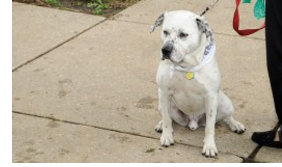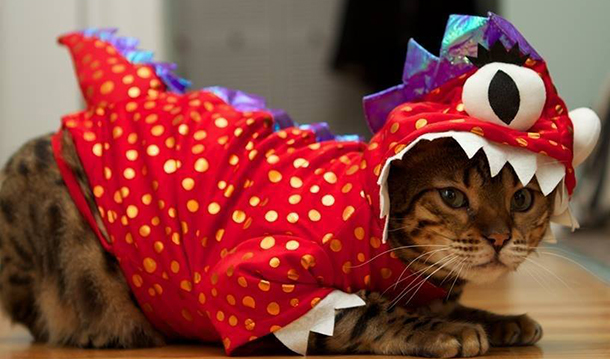Our Blog
Meet Dr. Brett Grossman (and Emerson, and Crocodile, and …)
Please join us in welcoming Dr. Brett Grossman, the newest clinician at the Medical District Veterinary Clinic at Illinois!
Since he started in late May, Dr. Grossman has quickly become a favorite with our clients and patients, including the adorable–and reportedly very food motivated–Oscar Biscuit Wilde, who appears calm and symmetrical with Dr. Grossman in the photo at right.His own pet family includes Emerson, a ridiculously mischievous terrier/whippet mix that was adopted from a nun in Arizona while the Grossmans were on vacation; Crocodile, a Russian Blue-mixed cat adopted off the streets of Greensboro, N.C., with an unusual proclivity for urinating in the toilet; and Bell, the family matriarch and a hyperthyroid tabby cat adopted from the South Side of Chicago.
“I am very excited to be practicing veterinary medicine in Chicago and helping the Medical District Veterinary Clinic grow,” says Dr. Grossman.
He is no stranger to Chicago. Before joining the Medical District Veterinary Clinic Dr. Grossman provided emergency veterinary care in the Chicago area for several years. And before embarking on a veterinary degree, he earned dual degrees in Analytical Philosophy and Neuroscience at the University of Illinois at Chicago and spent his time playing music and running record stores in the Chicago area.
He earned his veterinary degree from Western University of Health Sciences in California and completed a small animal internship in medicine and surgery at Carolina Veterinary Specialists in North Carolina.
To learn more about Dr. Grossman, see our “Meet Our Staff” page.
NEW UPDATE ON CANINE INFLUENZA OUTBREAK
 The recent canine influenza outbreak in Chicago is caused by a different strain of the virus than was earlier assumed. According to laboratory scientists at Cornell University and the University of Wisconsin, the outbreak is caused by a virus related to Asian strains of influenza A H3N2 viruses—not the H3N8 strain. Both strains can cause high fever, loss of appetite, coughing, nasal discharge, and lethargy. Symptoms may be more severe with the H3N2 virus. H3N2 has also caused infection and respiratory illness in cats.
The recent canine influenza outbreak in Chicago is caused by a different strain of the virus than was earlier assumed. According to laboratory scientists at Cornell University and the University of Wisconsin, the outbreak is caused by a virus related to Asian strains of influenza A H3N2 viruses—not the H3N8 strain. Both strains can cause high fever, loss of appetite, coughing, nasal discharge, and lethargy. Symptoms may be more severe with the H3N2 virus. H3N2 has also caused infection and respiratory illness in cats.
IMPORTANT UPDATE: Chicago Kennel Cough Outbreak
 In recent weeks we have seen a large number of coughing dogs here in Chicago. Most of the affected dogs have a history of frequenting day care, boarding facilities, and dog parks. At this time I recommend avoiding these facilities to help protect your dog, even if he/she has been vaccinated for “canine cough.”
In recent weeks we have seen a large number of coughing dogs here in Chicago. Most of the affected dogs have a history of frequenting day care, boarding facilities, and dog parks. At this time I recommend avoiding these facilities to help protect your dog, even if he/she has been vaccinated for “canine cough.”
Why isn’t vaccination sufficient protection? Let me explain a little about canine cough.
“Canine cough” (also called “kennel cough”) is a broad term to describe infectious tracheobronchitis. This highly contagious condition results in inflammation of the trachea and bronchus. Many viruses and bacteria can result in canine cough. Currently the intra-nasal vaccine recommended for dogs here at the Medical District Veterinary Clinic covers the three most common causes of canine cough: Bordetella (bacteria), Parainfluenza (virus), and Adenovirus (virus).
However, early test results from patients in this outbreak point to an underlying culprit of canine influenza (flu). There is a vaccine for canine influenza on the market, but it has not been widely used or recommended because of the low risk of canine influenza.
Most cases start with a mild cough, which eventually progresses to a loud, honking cough. Some pets have decreased appetite, depression, and fever. We have seen a number of dogs develop a secondary pneumonia. If your pet is showing any of these signs, please have your pet seen.
Due to the outbreak I recommend avoiding any direct dog-to-dog contact and vaccinating dogs at high risk, such as those that attend day care, boarding, grooming, or dog parks and dogs that live in high rises. Although the vaccine does not 100% prevent infection, it should reduce the number of affected dogs. The canine influenza virus can survive 48 hours on hard surfaces and 24 hours on clothing, thus it is very important to be cautious in elevators, hallways, and dog relief stations.
Dogs need a booster two to four weeks after the initial vaccination. Dogs are not considered protected until 14 days after the second vaccine. The vaccination lasts one year and must be given annually thereafter. We do not recommend vaccinating dogs that have been infected until at least four weeks after the infection has cleared. Not all dogs may need the vaccine.
Please call the Medical District Veterinary Clinic at Illinois with any questions: 312-226-2588.
ANOTHER REASON TO SMILE: Dental Discount Extended Through March
SMILE! Pet Dental Health Month Means Discounts
 A healthy smile means a healthy pet.
A healthy smile means a healthy pet.
We’re celebrating Pet Dental Health Month with a 10% discount on all dental services throughout the month of February. Bonus: UIC students, faculty and staff (with current I-cards) will receive a 15% dental discount during this time.
Call for an appointment today.
Come Next Saturday for Coffee, Cocoa & Pet Nutrition Advice
 Stop by on Saturday, January 24, between 11:00 am and 2:00 pm, to help us celebrate our revamped digs.
Stop by on Saturday, January 24, between 11:00 am and 2:00 pm, to help us celebrate our revamped digs.
- Enjoy a coffee/hot cocoa bar (with lots of yummy toppings)
- Bring your pet in for a complimentary body conditioning score
- Get advice on pet nutrition
- Tour our facilities
- Visit with our staff
Remember to enter through our new Suite 100 entrance.
THE NAUGHT & NICE LIST: Tips for a Happy & Pet-Safe Holiday
 The holiday season is a feast for the senses — bright lights and candles, mouthwatering treats and shiny, festive decor — which means it’s also filled with potentially hazardous temptations for your furry friends.
The holiday season is a feast for the senses — bright lights and candles, mouthwatering treats and shiny, festive decor — which means it’s also filled with potentially hazardous temptations for your furry friends.
So before you extend the holiday cheer to your animal companions, check out our “Naughty and Nice” list for tips on creating a happy and pet-safe holiday.
Naughty (Keep these out paw’s reach)
- Lilies
- Poinsettias
- Tinsel
- Lit candles
- Shiny, breakable ornaments
- Chocolate
- Grapes/raisins
- Macademia nuts
- Onions
- Fatty meat, stuffing or gravy
- Bread or bread dough
- Snow melt or salt (in case we get any of that white stuff they’re predicting)
Nice (Sure bets for safely sharing the holiday spirit)
- An active toy
- A soft, warm pet bed or blanket
- Lean turkey meat
- Cat- or dog-specific treats (much safer than people food)
- Extra play or snuggle time with you
Holiday Hours
We will be:
- Open from 8-12 pm on 12/24
- Closed on 12/25
- Closed on 12/28
- Open from 8-12 pm on 12/31
- Closed on 1/1
For emergency service during the holidays, contact VSC at Illinois at 312.226.3641.
Wishing you and your animal companions a healthy and happy holiday season!
HAVE A HAPPY AND PET-SAFE THANKSGIVING
 At Thanksgiving we look forward to sharing a feast with our families and friends. But should that celebration include our animal companions?
At Thanksgiving we look forward to sharing a feast with our families and friends. But should that celebration include our animal companions?
Probably not.
A typical Thanksgiving meal contains a number of foods that could put your pet’s health in serious danger.
- Onions, grapes/raisins and chocolate all contains ingredients that are toxic to cats and dogs.
- Rich fatty foods like dark meat turkey or gravy can put your pet at risk for pancreatitis.
- Bread and other yeast-filled items can cause bloat in dogs and should be kept out of paw’s reach.
- And as tempting as it may be to throw Fido a bone, doing so could cause choking or risk internal damage if a sharp piece is swallowed.
- The safest treat is a small amount of lean white meat turkey.
If your pet is nervous around strangers (or if your guests are nervous around pets), consider putting your furry friend in a separate room with a comfy blanket or pet bed. You might even let them tune into the Puppy Bowl.
Once the meal is over, show your pet some love with a long walk or a game of fetch. They’ll enjoy the extra activity and you’ll feel less guilty about the second piece of pie.
Thank you for choosing Medical District Veterinary Clinic at Illinois as your pet’s health and wellness home.
Happy Thanksgiving to all of our furry friends and their humans.
THE FALL FROLIC COSTUME CONTEST NEEDS YOUR VOTE
Help Us Choose the Paws-Down Winner!
 We have 11 furrtastic entries in our Fall Frolic Costume Photo Contest and we need your help choosing a winner. Just cast your vote with a “like.” The pet with the largest number of unique “likes” will get their paws on some serious swag.
We have 11 furrtastic entries in our Fall Frolic Costume Photo Contest and we need your help choosing a winner. Just cast your vote with a “like.” The pet with the largest number of unique “likes” will get their paws on some serious swag.
And don’t forget to share with your friends.
THE FALL FROLIC IS BACK BY POPULAR DEMAND
Join us on Saturday, November 1 from noon to 3 pm for the 2014 Furry Friends Fall Frolic.
- Dress your pets in their spooktacular best.
- Enjoy tricks and treats for pets and their humans.
- Get a free digital pet portrait and swag bag.
- All costumed pets in attendance with be entered into our Facebook Costume contest.
- Find out more on the Fall Frolic event page.
Help us make the Fall Frolic, more social:

![[black and white cat with Dr. Brett Grossman]](https://publish.illinois.edu/medicaldistrictvet/files/2015/06/mdvcblog_grossman.jpg)
